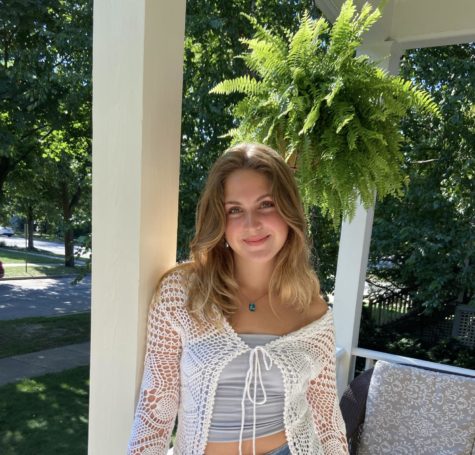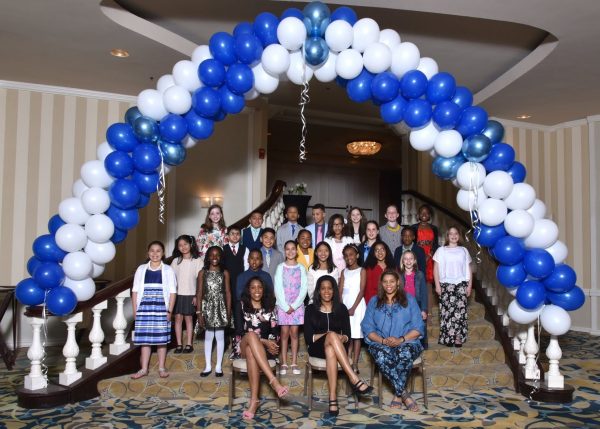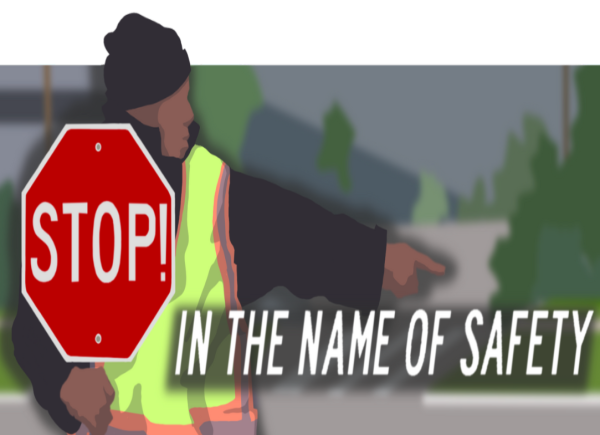2018 ETHS alum Sebastian Nalls on bid for alderman, running for mayor, and life as a long-time Evanstonian
Recently, I sat down with my neighbor and prospective Ninth Ward alderman candidate Sebastian Nalls. At just 20 years old, Nalls already has a distinguished resume, including interning for Governor Pritzker and running for Evanston mayor in 2021. He spoke about his experiences in politics, his future plans and the importance of civic engagement.
Meg Houseworth: Tell me a little bit about yourself. What have you been up to recently?
Sebastian Nalls: Yeah, [I’m] 22; born and raised in Evanston. I went to Pope John [K-8], and [then] ETHS. Since graduating in 2018, I [attend] Purdue University and major in accounting and political science, [with a] minor in sociology. [I] ran for Evanston Mayor back in February 2021, [and] it was an amazing experience. Since then, I’ve [worked] with local advocacy groups, [such as] the Community Alliance for Better Government, the YMCA [and] the Democratic Party of Evanston. [I’m] currently working in the Governor of Illinois’ Office of Equity while finishing up my last semester [of school].
MH: What is your role in Governor Pritzker’s Office of Equity?
SN: My responsibility [is] to implement diversity, equity, inclusion and accessibility plans for 38 state agencies, boards and commissions. I work consistently with the EIA team leaders and [each one of those] agencies. Right now I’m putting together an [online] resource guide on diversity, equity, inclusion and accessibility so state [organizations and] organizations outside the state can utilize those resources.
MH: You mentioned running for Evanston mayor last year, how was that experience?
SN: [I decided to run] one afternoon [in] summer [2020] when myself and some family-friends were talking about what we thought was going wrong [in the city] and what we could be doing better. I looked at everything that my peers were doing, Evanston Fight For Black Lives, for example, [and saw how they were] coming together, protesting and organizing food drives [and] coat drives. [It made me realize] that I can do something for the community. So I [decided to run] and at the very least push forward issues that people weren’t talking about and bring solutions to the table that people weren’t talking about before. [During the election, I was able] to connect with thousands of people over the span of six months [and] learned so incredibly much. Once that race ended, I knew that it wasn’t the end of anything. It was just the beginning. It was the beginning of a whole new chapter.
MH: What issues prompted you to run for mayor?
SN: One of the largest issues I noticed was [the] beach token policy. I worked for the City throughout high school as a Program Director for Chandler Newberger. [During camp,] we would have beach days, and I would ask kids, “How often do you go to the beach?”, And some of them would say, “We’ve never been to the beach before.” [Some] would say that their family just can’t afford to get beach tokens. [Our beaches] are a beautiful resource [and] should be accessible to everyone, so [the campaign] initially started with that. As I dug more and more into the city, I noticed that [council members] were overcomplicating things [by] bringing solutions to problems that weren’t incredibly thought out. We could be doing more instead of just putting words out there, [so] I was like, ‘Let’s actually identify these problems and identify solutions [to them].’
MH: Can you touch more on adults identifying problems without solutions? In what ways does that hinder our progress as a community?
SN: Previous generations have a different way of thinking and addressing problems than our generation does. For example, when it comes to policing, [our generation acknowledges that the] system has been inept for a long time [and] causes systemic problems to people of color [and the] LGBTQ+ community. We identify that [change] is possible [if we] uproot the entire system and rebuild that system. Older generations have been in the [police] system their entire life. For some people, it’s hard to identify systemic problems because it’s been working for them for so long. Some older people can identify those problems, but [the idea] of sweeping change can be incredibly frightening [for them]. There’s a disconnect between the two generations [in that way], and [that’s] natural … but older individuals need to understand that young people [are going to] fully inhibit this world 40-50 years from now [and their voices should be heard]. Young people [have] a wealth of knowledge, and we can’t dismiss that.
MH: How have you been able to navigate speaking to older authority figures and City Council? What were their reactions when you proposed “sweeping change”?
SN: At the start of my mayoral campaign, there were a lot of people who assumed that [I was running] as a joke, and didn’t take [me] seriously. Over time, however, [they saw] me provide an in-depth analysis to back my positions, so people [began to recognize] that [I knew what I was] talking about. It’s easy to dismiss someone when they’re young [and have] fresh, new ideas, but it’s hard to dismiss them when they’re positioned [and have facts]. [For example], the fact is, [in Evanston,] there’s an extreme affordability issue, and we need to figure out how to shift the burden from residents paying property taxes [to another venue]. [We need to ensure people] aren’t getting priced out of Evanston because they can’t afford to live here anymore. When I go to City Council, I present [an issue] and [a] qualified [way to] address it. [That way,] they can’t say that I’m complaining or my position isn’t based in fact. I’m bringing a solution to the table. If you don’t like that solution, find another solution yourself, but I’m bringing everything to the table, not even as an elected official, but as an Evanston resident.
MH: Your mayoral campaign was quite monumental, garnering 860 votes. What strategies were useful and what advice would you give to students interested in politics?
SN: Find someone who’s going to fight for [change] with you, not fight it for you. The campaign was not something that I could achieve on my own. It [required me to work] with people of all ages: old and young. When we came together, we were truly able to fight for our cause. [The process allowed me to see the value] in working with people from different [age] backgrounds, and that’s why I always try to platform as many people, especially younger people, as I possibly can, because they’re so integral [to making change]. I advise those interested in making change to seek out people who have similar interests, and build a coalition of people who are young and old.
MH: I love that you platform Evanstonians young and old. How did working with both age groups strengthen your campaign?
SN: It’s [was] a great experience, because you get a different perspective from each generation, [allowing for] a collaborative experience and creation of something truly special. When I was running I had a 12 or 13 year-old on my campaign, [and they had] such an intelligent mind. Obviously, I wanted to foster that and provide them a platform. At the same time, I had people that were in their late 30s, early 40s, and in their 60s and 70s that were on my campaign team [who] had the experience of actually going door to door knocking on people’s doors, having conversations, getting signatures, [and] putting information out there. We were able to come together [and create something meaningful].
MH: Do you have any current political ambitions?
SN: Right now, I’m seeking the appointment of the Ninth Ward Aderman because Councilmember Fleming is resigning from her office. Fleming did a great job of communicating with residents holding different events over the ward, so I look at [the election] as an opportunity to continue a lot of the work that she’s done, expand on it and really push for as much change as I possibly can.
MH: If you are elected, what are your initial action steps for the City and 9th Ward?
SN: The first [goal] is to hire a City Manager that is both qualified [and] holds beliefs that are similar to mine and the future of Evanston. The next step [would be to] hire a police chief [who’s] committed to police reform and willing to engage with the community and understand that local residents can be fearful of the police. I’d also like to work with Councilmember Kelly [who] is looking at institutions that don’t pay taxes, such as Northwestern, and see if they can contribute to Evanston financially to [help] ease that financial burden for residents. If we can alleviate that [burden,] Evanston becomes more affordable; so really looking at the possibility of reducing property taxes. Another key point I want to touch on is just community participation. A lot of [marginalized] residents have felt left out of the community [and] the political process [and I want to change that]. There was this Black and brown solidarity event in the Office of Equity that the State of Illinois put on, and we had [public] speakers, food, artists, musicians, and I would love to do something like that in the Ninth Ward [and] for the entirety of Evanston. It would be an event where people can experience different foods, music, artwork, cultures, and learn more about their neighbors and learn more about what issues are impacting them. It’s not necessarily easy to do, because [racial exclusion] is systemic, but it’s something that we can do to show our neighbors that we’re committed to being neighbors [and] being a community of family.
MH: Can you expand on marginalized residents feeling neglected in politics? What responsibility do we have as a community to change this?
SN: You have people that’ve felt like their opinions have been invalidated or their concerns aren’t really concerns for a whole lot of people. When I was running for mayor and spoke about issues impacting low income families, someone came up to me and said, “Sebastian, you will never win if you continue to focus on issues that impact low-income communities,” and I told them that if I wasn’t going to talk about those issues, then I didn’t want to win in the first place. If there are people in our community that are struggling, then that negatively affects every single one of us. It is better economically if we are all financially well-off instead of one group being less advantaged than the other. We have the ability to help these people, and we need to do it. We can’t just overlook that and overlook them. As a community, we can’t say [Evanston] is better than most places if we have people that are suffering [and] can’t afford to live here. In 10 to 20 years, if all those people leave because Evanston isn’t affordable anymore, is the problem really gone, or are we a completely different community? What [can] we claim as our strong suit—our diversity of race, religion, and socioeconomic status—if we ignore people who have been marginalized? We’ll lose our identity. Who will we become if that’s the case? If we understand we’re all in this together, as one Evanston family, [then] we’ll be stronger at the end of the day.
MH: What messages do you have to the readers of The Evanstonian?
SN: I just urge each and every one of you, because The Evanstonian is largely for younger audiences, to get involved [and to] understand that the decisions that occur at the local level, that [ones that] impact you on a day-to-day basis matter. Even though you can’t vote, your opinion matters, because you’re living here, and you’re a part of Evanston. You’re what makes Evanston special. You’re integral to Evanston. I want to make sure that experiences for people in Evanston were better than mine. [I want to make sure youth] have a better future and can say to their kids [one day], ‘I had a great experience growing up in Evanston. I want to come back here and raise my family.’ [I want] the next generation to be much more well off. It’s [with] that way of thinking where you truly see some systemic change. So for the [readers of The Evanstonian], stay involved. There will be plenty of opportunities to be involved, whether it’s advocacy groups [or] my campaign in 2023; you just have to go out and look.
MH: How can students get involved in your Alderman campaign?
SN: Reach out to me at [email protected], and I can provide you with that information. When the 2023 race starts, which will be in August of next year, we’ll need all the volunteers we can get.
Your donation will support the student journalists of the Evanstonian. We are planning a big trip to the Journalism Educators Association conference in Philadelphia in November 2023, and any support will go towards making that trip a reality. Contributions will appear as a charge from SNOSite. Donations are NOT tax-deductible.












